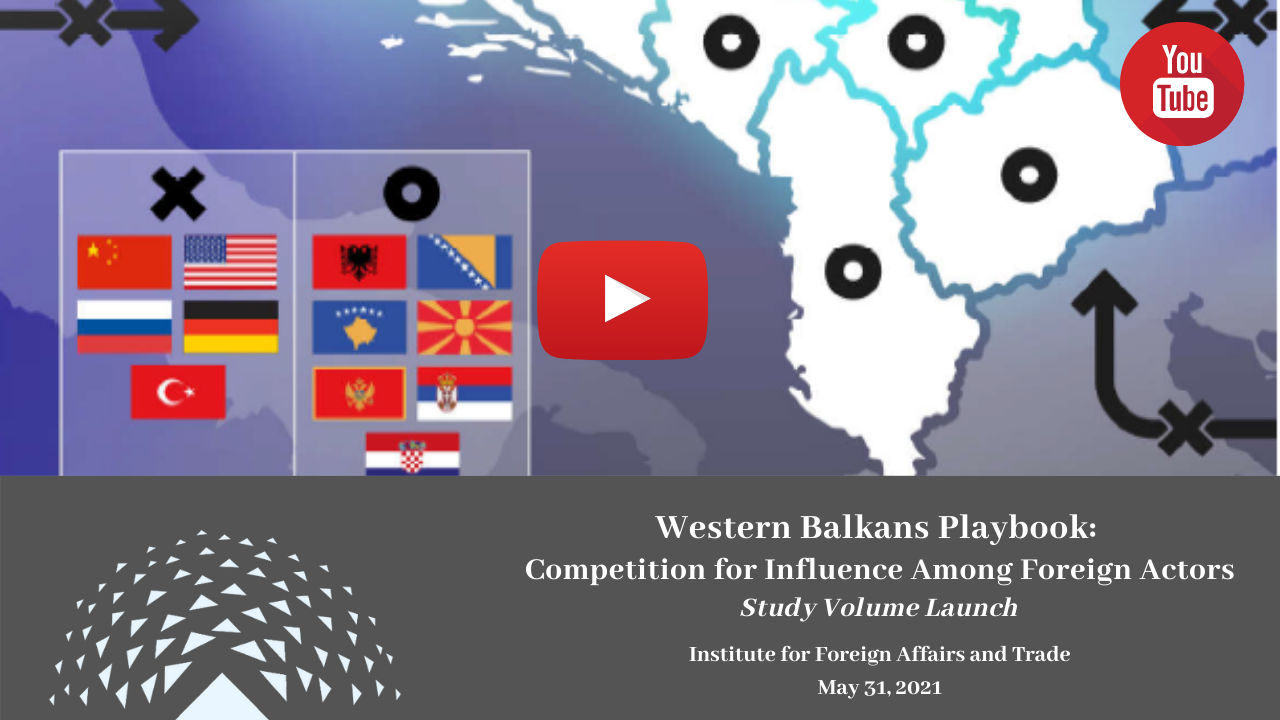The Institute for Foreign Affairs and Trade (IFAT) held an online launch of the volume titled “Western Balkans Playbook: Competition for Influence Among Foreign Actors” on 31 May 2021. The event was moderated by Anna Orosz, IFAT Research Fellow and Program Manager. After the welcoming remarks given by Márton Ugrósdy, Director of the Institute, Olivér Várhelyi, the European Commissioner for Enlargement and Neighbourhood held his keynote speech in which he reminded that EU integration of the Western Balkans remained a priority and despite the presence of other foreign actors, only the EU can serve as a model for the region, and he expressed his hope that 2021 will be the year of the Western Balkans. He also pointed out that the EU is the main trading partner and investor in the WB6, but credibility of the enlargement process is necessary to preserve the community’s transformative power. On the other hand, he underlined that accession is based on merits so close cooperation and political will is required from the governments of the region.
The event continued with a roundtable discussion with the co-authors of the volume and former Ambassador of Montenegro to NATO, Vesko Garčević. The US influence was analysed by Gergely Varga, Research Fellow and Program Manager of IFAT. He gave an instrumental importance to the US in shaping the region from the middle of 1990s.The security-military dimension is one of the core areas where Washington wants to exploit its advantages and leadership vis-a-vis China and Russia. Through that the US is able to compensate its relatively weaker leverage in other areas like economy and culture and remain a key player in the Balkan region in the future as well.
As for the German interests in the region, Tamás Levente Molnár, Research Fellow of IFAT drew on the similarities between the EU enlargement policy and the German approach to the Western Balkans. Namely, stabilization through the integration process, that promotes sustainability, rule of law and reconciliation. When it comes to the political and economic influence, Germany is the number one trading partner, but the nature of the trade relations is deeply unequal. In terms of military and defence, the German interests resemble the American ones.
Zoltán Egeresi, the Research Fellow of the Institute of Strategic and Defence Studies and external fellow of the IFAT elaborated the complexity of Turkish influence in the Western Balkans. Compared to the other great powers, Turkey is the smallest one, but it is culturally and geographically the closest one. Identity based policies play a crucial role in the relations with the Muslim communities and the soft power tools often appear in infrastructural projects as well. However, Turkish businessmen act along economic rationalities and prefer bigger markets like Serbia compared to Bosnia and Herzegovina, Kosovo, and Albania.
Ágnes Szunomár, Senior Research Fellow and head of Research Group on Development Economics at the Centre for Economic and Regional Studies of Institute of World Economics discussed China’s spheres of influence. She insisted that political and economic influence go hand in hand for China, meaning that Beijing enters into markets of friendly countries. China’s secrecy policy and infrastructural projects undermine the application of EU standards in the WB6 which makes EU decision-makers question the governments’ commitment to the EU integration process. Szunomár agreed that WB6 governments try to use their relations with China as a bargaining chip with the EU but also pointed out that the EU left these countries often disappointed that made them turn towards the Eastern partners (e.g., fighting COVID-19 pandemic).
Vesko Garčević underlined that the strategic direction for the region is the EU integration process which managed to incentives reforms, but the normative power of the EU got weaker as credibility of the process decreased. Eastern partners, like Russia can achieve greater leverage by better targeting its limited resources as a consequence of its cultural soft power. Beijing and Moscow so far did not consider each other as competitors as they can complement the others’ strengths. Garčević also added that political elites of the WB6 know how to use China and Russia to their own advantage against the EU, but this will unfortunately harm the interests of the citizens of the region.
So the future of foreign actors’ rivalry in the Balkans will largely depend on that how the relations of the EU and region will develop in the coming years and how much the EU will provide opportunities for other actors to pursue their own policies and interests.
The Western Balkans Playbook: Competition for Influence Among Foreign Actors book can be read here!
The full recording can accessed at the link below or on our YouTube-channel!
JTNDaWZyYW1lJTIwd2lkdGglM0QlMjIxMDAlMjUlMjIlMjBoZWlnaHQlM0QlMjI0NTAlMjIlMjBzcmMlM0QlMjJodHRwcyUzQSUyRiUyRnd3dy55b3V0dWJlLmNvbSUyRmVtYmVkJTJGQnp0RDFPQXJHVW8lMjIlMjB0aXRsZSUzRCUyMllvdVR1YmUlMjB2aWRlbyUyMHBsYXllciUyMiUyMGZyYW1lYm9yZGVyJTNEJTIyMCUyMiUyMGFsbG93JTNEJTIyYWNjZWxlcm9tZXRlciUzQiUyMGF1dG9wbGF5JTNCJTIwY2xpcGJvYXJkLXdyaXRlJTNCJTIwZW5jcnlwdGVkLW1lZGlhJTNCJTIwZ3lyb3Njb3BlJTNCJTIwcGljdHVyZS1pbi1waWN0dXJlJTIyJTIwYWxsb3dmdWxsc2NyZWVuJTNFJTNDJTJGaWZyYW1lJTNF

